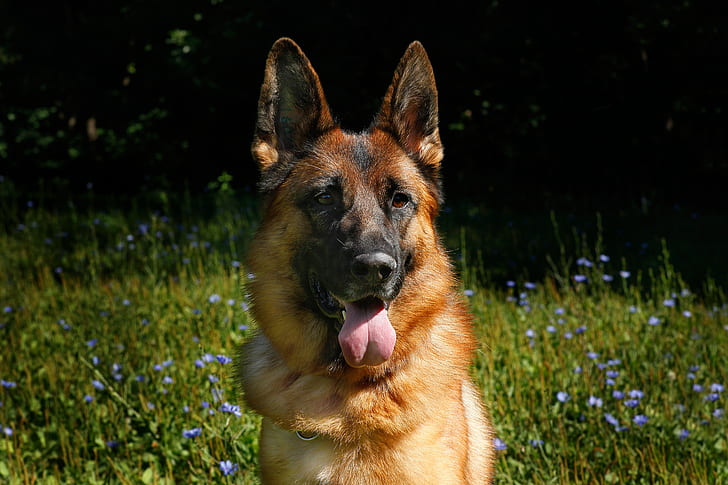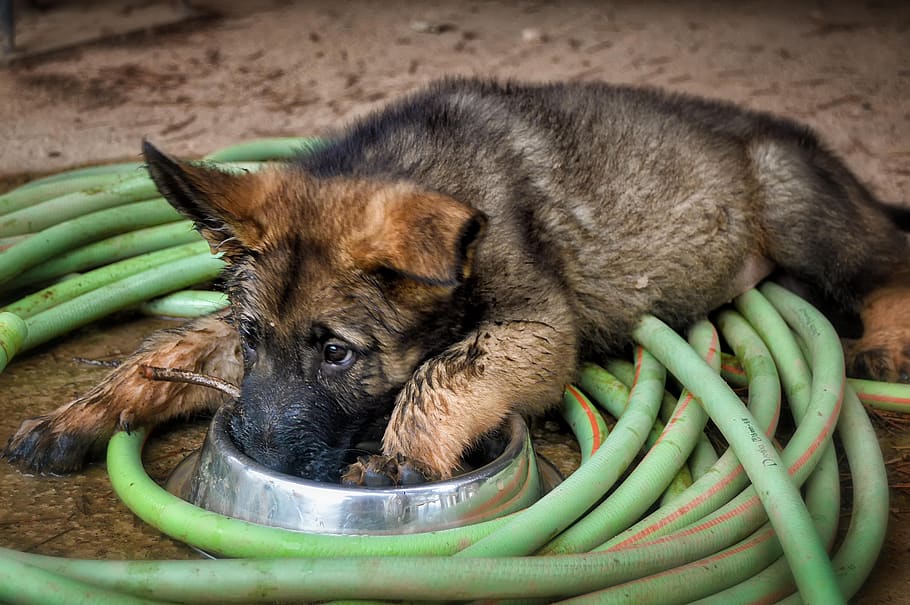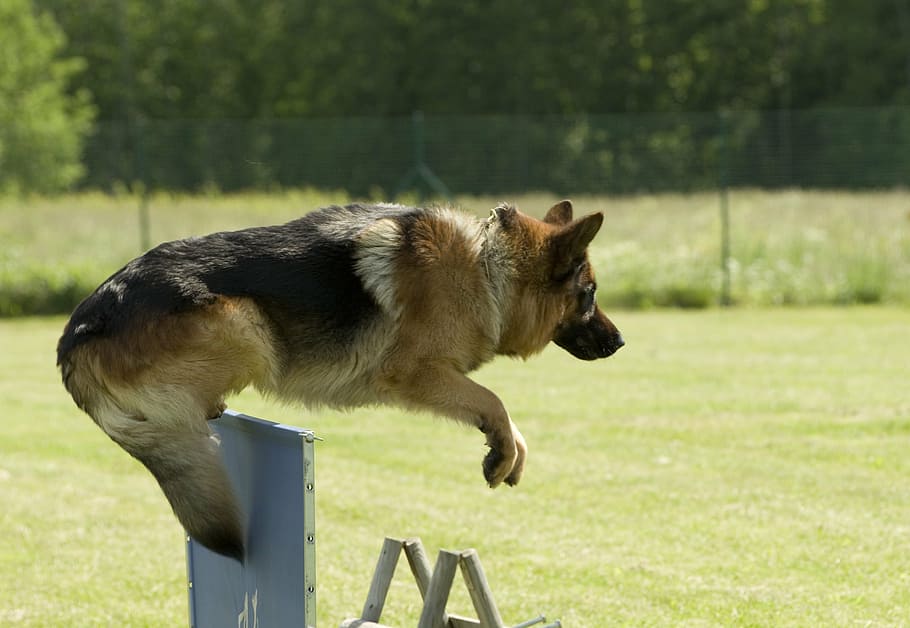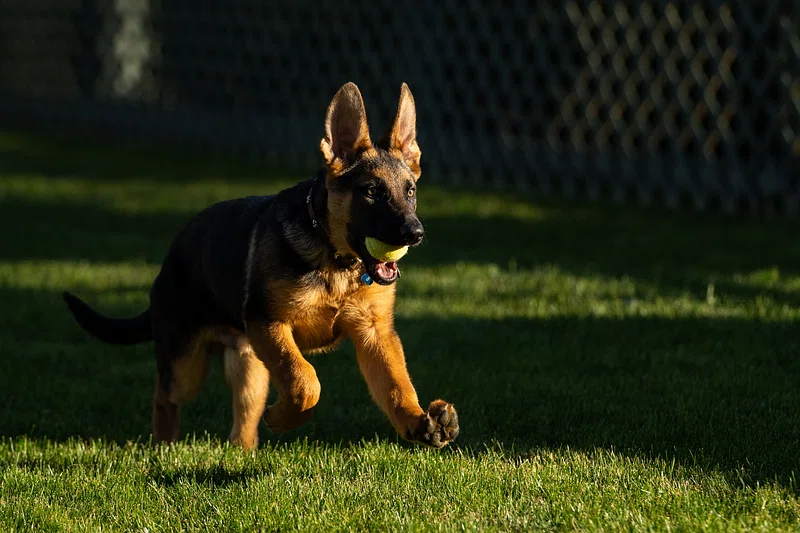Are you the proud owner of a 7-month-old female German Shepherd puppy? Congratulations on having a new addition to your doggy family! As your GSD puppy reaches the 7-month mark, it’s essential to provide her with the proper care and attention that this breed requires. A healthy diet is crucial for your puppies’ growth and development, and regular exercise can prevent behavioural problems. Moreover, routine veterinary check-ups ensure that she stays healthy and happy. Training and socialization are also critical aspects of your dog’s mental and emotional well-being, especially for this breed known for its intelligence and loyalty.
At this stage in your german shepherd puppy’s life, you might have some questions about how to take care of your dream dog properly. Don’t worry; we’ve got you covered with tips for your German shepherd doggy.
Understanding the Behavior of a 7-Month-Old German Shepherd
Sexual Maturity and Hormonal Changes
German Shepherds, also known as GSD, are one of the most popular dog breeds in the world. They are known for their intelligence, loyalty, and protective nature, making them a great choice for those looking for a loyal doggy companion. At around 7 months old, German Shepherd puppies reach sexual maturity, which can affect their behaviour due to hormonal changes. If you’re planning to adopt a GSD puppy, keep in mind that this milestone usually occurs in Aug.
Male German Shepherd puppies, also known as GSDs, may become more dominant during this period due to increased testosterone levels. They may display aggressive behaviour towards other dogs or even humans. It is crucial to train your GSD puppy during this time to prevent any unwanted behavior and ensure they grow up to be a well-behaved doggy of the breed.
Adolescence and Obedience Training
Adolescence in German Shepherds, a large dog breed, can last up to two years. During this time, they may exhibit rebellious behaviour similar to human teenagers. This is why obedience training is critical for gsd puppies or doggies during adolescence.
Positive reinforcement techniques such as treats, praise, and playtime can be used to reinforce good behaviour in your 7-month-old German Shepherd puppy, also known as your dream dog. Consistency is key in training your gsd or doggy.
Personality and Mindset
Understanding the personality and mindset of your German Shepherd puppy at this stage in its life can help you navigate its behaviour more effectively. Every doggy, including GSDs, has a unique personality, but there are some common traits found in German Shepherds.
They are highly intelligent German Shepherd dogs that require mental stimulation through activities like puzzle toys or agility training. They are also very loyal and protective of their family members, which makes them excellent guard dogs. If you’re looking for a GSD puppy, these doggies will surely steal your heart. Don’t forget to check out available litter this Aug!
Reinforcing Good Behavior
Reinforcing good behaviour in your 7-month-old German Shepherd puppy, or gsd doggy, is essential for creating a well-behaved adult dog. Positive reinforcement techniques, such as giving treats or praise when they follow commands correctly, will encourage them to repeat that behaviour. Don’t forget to continue this training throughout their aug years!
Consistency is key for your dream dog, the GSD puppy. Make sure everyone in the household, including your furry doggy, follows the same rules so that your German Shepherd does not become confused.


Essential Care for a 7-Month-Old German Shepherd
Feeding a 7-month-old German Shepherd
Feeding your 7-month-old German Shepherd puppy (gsd) is crucial to ensure their growth and development. At this age, your doggy requires a balanced diet with high-quality protein and essential nutrients. It’s important to choose a dog food that meets their nutritional needs and doesn’t contain fillers or artificial preservatives. Ensure you feed your gsd pup (aug) with the right food to support their healthy development.
Consider feeding your GSD a mix of dry kibble and wet food to provide them with variety in texture and flavour. You can also add fresh fruits and vegetables as healthy treats for your doggy. However, avoid giving your puppy human foods like chocolate, grapes, onions, and garlic, as these can be toxic to dogs. Don’t forget to schedule an aug check-up with your veterinarian to ensure your GSD is healthy and happy.
To determine the right amount of food for your 7-month-old German Shepherd puppy, consult with your veterinarian based on their weight, activity level, and overall health. It’s important to adjust the food intake as your gsd grows and ages, so make sure to check in with your vet regularly. Augmenting the diet with appropriate supplements can also help maintain their health and well-being.
Regular Exercise and Training
Regular exercise is vital for the physical and mental development of your 7-month-old German Shepherd puppy (GSD). They need plenty of opportunities to run around, play fetch, and go on walks or hikes to burn off energy at this age (aug). This will help keep them healthy while preventing behaviour problems due to boredom or pent-up energy.
Training is also essential for your German Shepherd puppy (gsd) at this age as it helps build strong bonds between you and your dog while teaching them good manners. Start with basic commands like “sit,” “stay,” “come,” and “heel” using positive reinforcement techniques such as treats or praise when they obey commands correctly. Augment your training by sharing your progress with other gsd owners in online forums or social media groups.
Socialization is equally important for a young German Shepherd puppy like yours, also known as GSD or German Shepherd dog. Share new people, places, and animals gradually with them so they can learn how to behave appropriately in different situations.
Proper Grooming
Proper grooming is necessary to maintain the health and hygiene of your 7-month-old German Shepherd puppy (GSD). Brushing their coat regularly will prevent matting while keeping their skin clean by distributing natural oils throughout their fur. As an Aug user, it’s important to establish a grooming routine to ensure your gsd stays healthy and happy.
Bathing your German Shepherd puppy should be done once every two months or when they get dirty to ensure the comfort of both the pup and the user. Augmented with proper grooming, it will help maintain the hygiene of your GSD.
Nutrition and Feeding Guide for a 7-Month-Old German Shepherd
Balanced Diet is Key
Feeding your 7-month-old German Shepherd puppy (gsd) requires a balanced diet to ensure they receive the essential nutrients needed for growth and development. A balanced diet should consist of protein, carbohydrates, fat, vitamins, and minerals. As an aug, it is important to provide your GSD puppy with a diet that meets their nutritional needs. So, users, make sure to consult with a veterinarian for specific feeding recommendations.


A natural Diet is Recommended.
A natural diet consisting of raw meat, vegetables, and fruits is recommended for your German Shepherd puppy. Raw food provides enzymes that aid in digestion and help maintain healthy teeth and gums. Vegetables such as carrots and broccoli provide vitamins, while fruits like apples and bananas provide fibre.
Avoid Table Scraps or Processed Foods
Table scraps or processed foods should be avoided when feeding your German Shepherd puppy. These types of food can cause digestive problems or even lead to obesity in puppies.
Consult with Your Veterinarian
Consult with your veterinarian to determine the appropriate feeding schedule and portion sizes for your 7-month-old German Shepherd puppy. Every puppy has different nutritional needs based on their size, weight, activity level, and overall health status.
It depends on their weight. On average, a 7-month-old male German Shepherd puppy weighs around 55 pounds, while female puppies weigh around 45 pounds. However, this can vary depending on genetics.
To feed a seven-month-old German Shepherd puppy:
- Determine the appropriate amount of food for your German Shepherd puppy based on its weight.
- Divide the total daily amount into two meals.
- Feed them at regular times each day.
- Provide fresh water at all times.
Grooming Your 7-Month-Old German Shepherd: What You Need to Know
Importance of Grooming for Adult Size and Coat Maintenance
Grooming your 7-month-old German Shepherd puppy is crucial for maintaining its adult size and coat. Regular grooming sessions help remove loose hair, dirt, and debris that can cause skin irritation and matting, especially in a growing puppy. It also helps distribute natural oils throughout the coat, keeping it healthy and shiny.
To keep your German Shepherd puppy comfortable during grooming sessions, start by introducing them to the tools you will be using. Let your German Shepherd puppy sniff and explore each tool before you begin using it on them. Use positive reinforcement techniques such as treats or praise to make grooming a positive experience for your German Shepherd puppy.
Proper Training to Make Grooming a Positive Experience
Proper training is necessary to make grooming a positive experience for your German Shepherd puppy. Start by introducing them to the tools you will be using one at a time, starting with the least intimidating tool first. Gradually work up to more advanced tools such as clippers or scissors.
Make sure your German Shepherd puppy is comfortable with being touched all over their body, including sensitive areas such as their paws and ears. This will make it easier for you to groom those areas without causing discomfort or fear in your German Shepherd puppy.
Understanding Adult Teeth Development
Information on a puppy’s adult teeth development is important when grooming your 7-month-old German Shepherd. At this age, they will have most of their adult teeth but may still have some baby teeth remaining.
Be gentle when brushing around the mouth of your German Shepherd puppy to avoid causing discomfort from loose or sensitive teeth. If you notice any loose or broken teeth during grooming sessions, contact your veterinarian immediately.
Additional Tips
In addition to proper training and understanding adult teeth development, there are some additional tips that can help ensure successful grooming sessions with your 7-month-old German Shepherd puppy.
- Use high-quality grooming tools that are appropriate for your German Shepherd puppy’s coat type.
Common Health Issues in 7-Month-Old German Shepherds
Hip Dysplasia and Arthritis
Hip dysplasia is a common genetic issue that affects German Shepherd puppies. It occurs when the hip joint doesn’t develop properly, causing the bones to rub against each other. This can lead to arthritis, which is inflammation of the joints. Signs of hip dysplasia in puppies include difficulty standing up or climbing stairs, limping, and reluctance to move around.
If you suspect your German Shepherd puppy has hip dysplasia or arthritis, take them to the vet for an evaluation. Treatment options may include medication, physical therapy, or surgery.
Obesity
Obesity is a growing concern for 7-month-old German Shepherd puppies and can lead to various health problems such as heart disease and diabetes. To prevent obesity, make sure your puppy gets enough exercise and eats a healthy diet.
Avoid feeding your German shepherd puppy table scraps or too many treats, as these can add unnecessary calories to their diet. Instead, feed them high-quality dog food that is appropriate for their age and activity level.
Allergies
Allergies can also be a health problem for 7-month-old German Shepherds. Common allergens include pollen, dust mites, and certain foods.
Symptoms of allergies in German Shepherd puppies include itching, redness of the skin, hair loss, and ear infections. If you suspect your German Shepherd puppy has allergies, take them to the vet for an evaluation. Treatment options may include medication or allergy shots.
Disease
Diseases such as cancer and diabetes can affect the health of 7-month-old German Shepherds. While there’s no guaranteed way to prevent these diseases from occurring in your dog, there are steps you can take to reduce their risk.
For example:
- Keep your dog at a healthy weight.
- Make sure they get plenty of exercise.
- Feed them a healthy diet.
- Take them to the vet for regular check-ups.
Exercise and Playtime for a 7-Month-Old German Shepherd
Importance of Exercise for Your Puppy
Exercise is essential for your 7-month-old German Shepherd puppy’s physical and mental well-being. As a large breed dog, they require plenty of exercise to stay healthy and happy. Regular exercise helps prevent health issues like obesity, joint pain, and other related problems.


Dog Parks: A Great Place for Exercise and Socialization
Dog parks are great places to take your pup for exercise and socialization. They provide ample space for your dog to run around freely, play with other dogs, and socialize with humans. It’s also an excellent opportunity to train your puppy on how to interact with other dogs in a controlled environment.
Incorporate Training Exercises into Playtime
Training exercises can be incorporated into playtime with your pup. This method is an effective way to engage your puppy mentally while providing them with physical activity. For instance, you can teach them basic commands such as “sit,” “stay,” or “come.” These commands help build obedience skills that will come in handy when taking walks or going out in public.
Toys and Games Provide Mental Stimulation during Exercise Time
Toys and games can provide mental stimulation during exercise time for your German Shepherd puppy. You can use toys like balls or frisbees to play fetch with your German Shepherd puppy while incorporating training exercises like recall or sit-stay commands. Puzzle toys are also great options that challenge the minds of German Shepherd puppies while keeping them physically active.
Ensuring Your Large Breed Dog Gets Enough Exercise
It’s crucial to ensure that your large breed dog gets enough exercise daily. A 7-month-old German Shepherd puppy needs at least two hours of exercise every day. However, it’s important not to over-exercise them as it could lead to joint problems later in life.
Working with Trainers
Working with a professional trainer can help you develop an effective exercise routine for your puppy.
Socialization Techniques for Your 7-Month-Old German Shepherd
Why Socialization is Crucial for Your 7-Month-Old German Shepherd’s Development
Socialization is a critical aspect of your 7-month-old German Shepherd’s development. It involves exposing your dog to different people, animals, and environments to help them adjust and become well-rounded adults. A well-socialized dog is confident, friendly, and less likely to develop behavioural problems.
How Obedience Training Can Help Your German Shepherd Learn Basic Obedience Commands
Obedience training is an important part of socializing your 7-month-old German Shepherd. It teaches them basic obedience commands such as sit, stay, come, and heel. These commands are essential for keeping your dog safe in various situations and building a strong bond between you and your furry friend.
During obedience training, you should use positive reinforcement techniques such as treats or verbal praise to reward the good behaviour of your German Shepherd puppy. This will make the training experience more enjoyable for both you and your furry friend.
The Effectiveness of Positive Reinforcement During Socialization and Obedience Training
Positive reinforcement is a highly effective technique during socialization and obedience training for your German Shepherd puppy. It involves rewarding good behaviour with treats or verbal praise instead of punishing bad behaviour. This approach helps build trust between you and your German Shepherd puppy while creating a positive learning environment.
Here are some examples of positive reinforcement techniques that you can use with your German Shepherd puppy:
- Treats: Use small treats like kibble or soft treats to reward good behaviour in your German Shepherd puppy.
- Verbal Praise: German Shepherd puppies love hearing their owner’s voice! Use phrases like “good boy/girl” or “well done” when they display good behaviour.
- Toys: Use toys as rewards during playtime after successful training sessions with your German Shepherd puppy.
- Clicker Training for German Shepherd Puppy: Clicker training involves using a clicker sound to mark desirable behaviour followed by a treat or verbal praise for your German Shepherd puppy.
Creating a Safe and Comfortable Living Space for Your 7-Month-Old German Shepherd
Importance of Providing a Safe and Comfortable Home
Providing your German Shepherd puppy with a healthy living space is one of the most important things. A safe and comfortable home environment can ensure that your furry friend grows up to be a happy and healthy German Shepherd puppy.
Addressing Resource Guarding Issues
Resource guarding is a potential issue that may arise when you bring home your new German Shepherd puppy. It’s essential to address this behaviour early on in their growth process. Sharing your belongings with them can help prevent resource guarding from becoming an issue in the future.
One excellent way to share your belongings with your furry friend is by giving them their own toys and chew bones. This will not only keep them entertained but also teach them what they can and cannot play with.
Maintaining a Good Coat and Preventing Heat-Related Issues
The coat of your female German Shepherd requires hard work to maintain its quality. Regular grooming sessions are necessary for keeping it clean, shiny, and free from knots or tangles. Brushing her fur at least once every week will help keep her coat looking good while preventing any potential skin issues.
Since these dogs are animals that have thick coats, heat-related issues are always a concern. During hot weather or summer months, it’s crucial to keep them cool by providing plenty of water, shade, and air conditioning indoors.
Dealing with Separation Anxiety in Your 7-Month-Old German Shepherd
Common Fear in GSDs
Separation anxiety is a common fear among many dog breeds, and German Shepherds are no exception. At around seven months old, your furry friend may start to exhibit signs of separation anxiety when you leave them alone.
Destructive Behavior Caused by Fear
If your GSD experiences separation anxiety, it may become destructive when left alone. Chewing furniture, digging holes, and barking excessively are all signs that your pet is struggling with the fear of being left alone.
Patience and Training to Overcome Anxiety
Fortunately, with patience and consistent training, you can help your pet overcome separation anxiety. Start by leaving your dog alone for short periods of time and gradually increase the duration as they become more comfortable.


Involving the Entire Family in Training
It’s important to involve the entire family in training to ensure consistency and reinforce positive behaviour. Encourage family members to spend quality time with your pet while you’re away to prevent feelings of loneliness.
Avoiding Decisions Based on Opposite Sex
While it may be tempting to get another pet of the opposite sex as a solution for separation anxiety, this decision should not be taken lightly. Introducing another animal into your home can cause additional stress for both pets and may not solve the root issue.
Travelling with Your 7-Month-Old German Shepherd: Tips and Tricks.
Signs that your 7-month-old German Shepherd is ready for travel
Before you embark on a long trip with your furry friend, it’s essential to ensure that they are ready for the journey. Signs that your 7-month-old German Shepherd is ready for travel include:
- Comfortable in their crate or carrier
- Well-behaved around new people and environments
- Responds well to commands and training
If your pup exhibits these signs, then they are likely ready to hit the road with you.
The best way to prepare your German Shepherd for a long trip
Preparation is key. Here are some tips to help you prepare them for a long trip:
- Start by getting them used to their crate or carrier at home.
- Gradually increase the amount of time they spend in their crate.
- Take them on short car rides before embarking on a long journey.
- Make sure they have all the necessary vaccinations and paperwork.
- Pack enough food, water, and medication if needed.
By following these steps, you can help ensure that your pup is comfortable during the journey.
Tips for keeping your German Shepherd calm and comfortable during travel
Travelling can be stressful for pets, but there are things you can do to keep them calm and comfortable during the journey:
- Bring along familiar items such as toys or blankets from home.
- Use calming aids such as pheromone sprays or supplements.
- Take breaks every few hours so your dog can stretch its legs and relieve itself.
- Play soothing music during the drive.
These tips will help alleviate any anxiety or discomfort that may arise during travel.
Ways to ensure your German Shepherd stays safe while on the road
Safety should always be a top priority when travelling with pets.
Caring for Your 7-Month-Old German Shepherd
Congratulations on having a 7-month-old German Shepherd! This is an exciting time as your pup is growing and developing rapidly. It’s important to provide the best care possible to ensure they remain healthy and happy.
Understanding their behaviour, providing essential care, proper nutrition, grooming, exercise, socialization, safe living space, dealing with separation anxiety, and travelling tips are crucial aspects of caring for your furry friend. By following these guidelines and being consistent with their care routine, you can help them become well-adjusted adult dogs.
Remember to always consult with your veterinarian if you have any concerns about your dog’s health or behaviour.
Here are some FAQs that may influence purchase decisions:
What kind of food should I feed my 7-month-old German Shepherd?
Your German Shepherd needs a balanced diet that includes protein, fat, carbohydrates, vitamins, and minerals. Choose a high-quality dog food that meets their nutritional needs based on their size and activity level.
How often should I groom my 7-month-old German Shepherd?
Grooming requirements vary depending on the length of your dog’s coat. However, it’s recommended to brush them at least once a week to prevent matting and remove loose fur. Bathe them only when necessary using dog-specific shampoo.
Can I leave my 7-month-old German Shepherd alone at home?
It’s not recommended to leave your puppy alone for more than four hours at a time, as they may develop separation anxiety. Gradually increase the time they spend alone while providing toys or treats for entertainment.
How much exercise does my 7-month-old German Shepherd need?
German Shepherds are active dogs that require daily exercise, such as walks or playtime in the backyard. Aim for at least one hour of physical activity per day to keep them healthy and happy.


